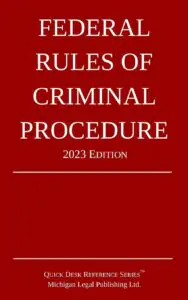Go directly to the 2024 Federal Rules of Criminal Procedure table of contents »
The Federal Rules of Criminal Procedure (FRCP) are a set of rules that govern the  procedures followed in criminal cases within the federal court system of the United States. These rules were established to ensure the fair and efficient administration of justice in federal criminal proceedings. The FRCP were first adopted by the Supreme Court in 1944 and have since undergone revisions to adapt to the changing legal landscape.
procedures followed in criminal cases within the federal court system of the United States. These rules were established to ensure the fair and efficient administration of justice in federal criminal proceedings. The FRCP were first adopted by the Supreme Court in 1944 and have since undergone revisions to adapt to the changing legal landscape.
The primary objective of the FRCP, as stated in Rule 1, is to ensure the just determination of every criminal proceeding. The rules are designed to promote simplicity in procedure, fairness in administration, and the elimination of unnecessary expenses and delays. These principles are essential to safeguarding the rights and interests of individuals accused of crimes.
The FRCP covers various stages of a criminal case, starting from the initial investigation to trial, sentencing, and appeals. It ensures that the rights of defendants, as enshrined in the United States Constitution, are protected throughout the process. The Fourth, Fifth, Sixth, and Eighth Amendments play a significant role in shaping the rules governing criminal procedure. These amendments protect individuals from unreasonable searches and seizures, ensure the right against self-incrimination, guarantee the right to counsel, and prohibit cruel and unusual punishment.
The FRCP emphasizes the importance of due process, equal treatment, and the protection of constitutional rights. It ensures that defendants are informed of the charges against them, have access to relevant evidence, and are provided an opportunity to present their case. By establishing rules for arrest warrants, initial appearances, and bail conditions, the FRCP ensures that the rights of the accused are respected from the very beginning of the criminal process.
Go directly to the 2024 Federal Rules of Criminal Procedure table of contents »